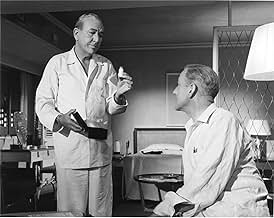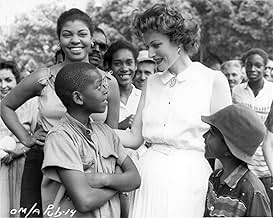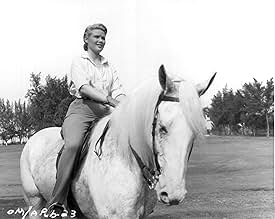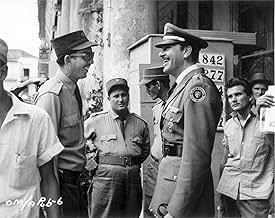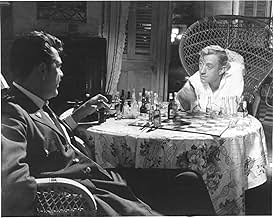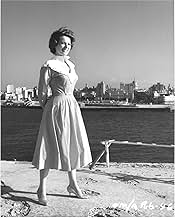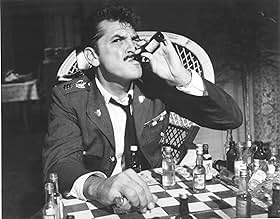PUNTUACIÓN EN IMDb
7,2/10
6,4 mil
TU PUNTUACIÓN
Jim Wormold, vendedor de aspiradoras, participa como agente en el Servicio Secreto Británico.Jim Wormold, vendedor de aspiradoras, participa como agente en el Servicio Secreto Británico.Jim Wormold, vendedor de aspiradoras, participa como agente en el Servicio Secreto Británico.
- Premios
- 2 nominaciones en total
Grégoire Aslan
- Cifuentes
- (as Gregoire Aslan)
Joseph G. Prieto
- Lopez
- (as Jose Prieto)
Reseñas destacadas
"Our Man in Havana" has all of the elements of a sure-fire classic: a cast that includes Alec Guinness, Burl Ives, Noel Coward, a very lovely Maureen O'Hara and Ralph Richardson; a screenplay by Graham Greene adapted from his own novel; and direction by Carol Reed, who had tackled Greene before and made one of the best films in history ("The Third Man").
So why doesn't "Our Man in Havana" entirely work? I'm not sure, but I found myself wanting to like this movie far more than I actually did. Guinness plays a vacuum cleaner salesman living in Havana who gets recruited by the British secret service to do spy work for them. He doesn't want to be a spy but wants the fat paychecks that come with it, so he feeds them fake information to avoid having to do any actual work. But when very real consequences arise from his false information, he suffers a moral crisis.
And maybe that's where the movie stumbles. That moral crisis is never made explicit, and the movie gets sidetracked into a revenge storyline as Guinness plans the murder of another agent out to get him. The film isn't as playful as the book, so it's not very funny when it should be, but since it doesn't examine the more serious themes inherent in the story as thoroughly as it could, there's nothing to fill the gap where the humor used to be.
This film isn't exactly a misfire, but it's certainly no "Third Man."
Grade: B
So why doesn't "Our Man in Havana" entirely work? I'm not sure, but I found myself wanting to like this movie far more than I actually did. Guinness plays a vacuum cleaner salesman living in Havana who gets recruited by the British secret service to do spy work for them. He doesn't want to be a spy but wants the fat paychecks that come with it, so he feeds them fake information to avoid having to do any actual work. But when very real consequences arise from his false information, he suffers a moral crisis.
And maybe that's where the movie stumbles. That moral crisis is never made explicit, and the movie gets sidetracked into a revenge storyline as Guinness plans the murder of another agent out to get him. The film isn't as playful as the book, so it's not very funny when it should be, but since it doesn't examine the more serious themes inherent in the story as thoroughly as it could, there's nothing to fill the gap where the humor used to be.
This film isn't exactly a misfire, but it's certainly no "Third Man."
Grade: B
This afternoon I chanced upon this terrific film on Channel 4.I had seen it years ago as a child,and couldn't understand why my father kept referring to the brilliant " Our Man in Havana" Now I know what he meant.Alec Guinness hit the perfect note in the part,as he invariably did.Havana is rendered almost tangible by director Carol Reed, a difficult feat to achieve.The rest of the cast shine too.Ernie Kovacs makes a human being out of his police-thug character.The script seems almost improvised,so fresh , pointed and witty.Compare this movie to the bulk of today's garbage,and prepare to feel very let-down by what you can see at your local Multiplex.This strange and sharp movie has re-affirmed my intention to spend some time in Havana.Buena Vista Social Club first whetted my curiosity.This movie is timeless and a great 2 hrs of entertainment/art.Enjoy! And look at Maureen O ' Hara, is she not quite splendid? !
10bob998
My idea of paradise would be sitting down with a DVD boxed set of Alec Guinness comedies from the 1950's. What will it be tonight? The Man in the White Suit, or The Ladykillers (both by Mackendrick)? Or Kind Hearts and Coronets, where he played eight parts to perfection? No, tonight will be Our Man in Havana, the blackest of black comedies, directed by Carol Reed from Graham Greene's novel. The tone of confusion and mounting panic, the sense of things sliding hopelessly out of control is perfectly caught by Reed, who had already given us the classic The Third Man.
The casting is very good. Noel Coward, Gregoire Aslan, Ferdy Mayne and especially Burl Ives as Hasselbacher, the most reluctant of spies are all impressive. Maureen O'Hara is a Rolls Royce when a Morris would have done for this story, but she plays well. I liked Ernie Kovacs as Segura, the brutal police chief; he had a nice vulgarity blended with sensitivity that worked for me.
Now my pleasure would be complete if this picture were available on DVD, and if IMDb would give us the memorable quotes this film abounds in. Like Segura: "one never tortures except by a kind of mutual agreement", or Beatrice's description of her estranged husband: "He was very beautiful; he had a face like a young fledgling looking out of the nest in one of those nature films..."
The casting is very good. Noel Coward, Gregoire Aslan, Ferdy Mayne and especially Burl Ives as Hasselbacher, the most reluctant of spies are all impressive. Maureen O'Hara is a Rolls Royce when a Morris would have done for this story, but she plays well. I liked Ernie Kovacs as Segura, the brutal police chief; he had a nice vulgarity blended with sensitivity that worked for me.
Now my pleasure would be complete if this picture were available on DVD, and if IMDb would give us the memorable quotes this film abounds in. Like Segura: "one never tortures except by a kind of mutual agreement", or Beatrice's description of her estranged husband: "He was very beautiful; he had a face like a young fledgling looking out of the nest in one of those nature films..."
Our Man in Havana (1959)
A lovely movie, funny and trenchant in its own way, and a precursor to Dr. Strangelove with its wry criticism of the Cold War and government ineptness. In this case, it isn't the atom bomb at hand, but the spread of communism into the colonies--though, to be fair, I don't think the word communism ever comes up.
Anyway, the simple trick of a recently hired agent trying to save his minor reputation by inventing things right and left, and having the upper levels not see through it, is hilarious. Yes it's implausible as shown, but the idea isn't so far fetched, and Alec Guiness, the protagonist, pulls it off with droll, steady humor and cleverness.
Cuba, of course, was in upheaval, and the truth of the revolution in the hills became a dramatic revolution shortly before filming took place. For political reasons, a note declares at the start that the film is set before Castro's takeover, so the corruption shown would be attributed to the overthrown government. A terrific background is given at the TCM site here (www.tcm.com/thismonth/article/?cid=143178).
The writing, by Graham Greene, is first rate, and keeps the farce in perfect balance, even with some of the secondary actors (Burl Ives, Noel Coward) hamming it up slightly. The director is the legendary Carol Reed (The Third Man) and between Guiness and him (and Greene), the movie has a British tilt--indeed, it was filmed mostly in Havana with followup work in Shepparton Studios, London. It's completely fun, well filmed, and if at times frivolous, maybe that's just a tonic for the times, and the real life drama of 1959 Cuba.
A lovely movie, funny and trenchant in its own way, and a precursor to Dr. Strangelove with its wry criticism of the Cold War and government ineptness. In this case, it isn't the atom bomb at hand, but the spread of communism into the colonies--though, to be fair, I don't think the word communism ever comes up.
Anyway, the simple trick of a recently hired agent trying to save his minor reputation by inventing things right and left, and having the upper levels not see through it, is hilarious. Yes it's implausible as shown, but the idea isn't so far fetched, and Alec Guiness, the protagonist, pulls it off with droll, steady humor and cleverness.
Cuba, of course, was in upheaval, and the truth of the revolution in the hills became a dramatic revolution shortly before filming took place. For political reasons, a note declares at the start that the film is set before Castro's takeover, so the corruption shown would be attributed to the overthrown government. A terrific background is given at the TCM site here (www.tcm.com/thismonth/article/?cid=143178).
The writing, by Graham Greene, is first rate, and keeps the farce in perfect balance, even with some of the secondary actors (Burl Ives, Noel Coward) hamming it up slightly. The director is the legendary Carol Reed (The Third Man) and between Guiness and him (and Greene), the movie has a British tilt--indeed, it was filmed mostly in Havana with followup work in Shepparton Studios, London. It's completely fun, well filmed, and if at times frivolous, maybe that's just a tonic for the times, and the real life drama of 1959 Cuba.
Comedy and espionage make uneasy bedfellows in this Alec Guinness vehicle. Viewers should expect more of a morality play than a gleeful farce.
Guinness frequently played characters leading double lives. Here we see his character Wormold tripped up by one that may cost him his life. Wormold is a vacuum cleaner salesman in Havana who is approached by a fellow named Hawthorne (Noel Coward), alias Agent 59200, who wants Wormold to serve the British Secret Service "for $150 a month and expenses" as his subagent, 59200/5, collecting secret information regarding pre-Castro Cuba.
Encouragement for this comes not only indirectly from his love for his spendthrift daughter Milly (Jo Morrow) but more directly from his best friend, a castoff German doctor named Hasselbacker (Burl Ives), whose advice forms the heart of the message from screenwriter Graham Greene, adapting his own novel:
"That sort of information is always easy to give. If it is secret enough, you alone know it. All you need is a little imagination...As long as you invent, you do no harm. And they don't deserve the truth."
The joke, which is also the story's tragedy, is Wormold invents too well, convincing not only his London paymasters but the opposition of his fiction's veracity. Director Carol Reed famously made a spy film, "The Third Man," which blended tragedy and comedy in equal measure. This time, the comedy is more front-and-center, but efforts at creating a light tone conflict with the more serious message and various characters' fates. "Our Man In Havana" struggles at times with what kind of film it wants to be.
Perhaps Guinness's own difficulty with his part contributes to this confusion. He reportedly found Reed's instruction ("Don't act!") unhelpful. Ives is especially heavy for the film's most delicate part, making it oppressively sad; I wish that Reed's collaborator Orson Welles could have taken this part and invested it with some of his trademark cunning and craft.
Much of "Our Man In Havana" does work, and well. Oswald Morris's cinematography employs actual Havana locations to great effect, using unusually angled shots of the crumbling, sun-drenched city. You feel the tension of Wormold's world in every scene. Ernie Kovacs, a hero of early TV comedy, gets a lot out of a thanklessly straight part, the menacing but sensitive Segura, who lusts for Milly and explains his position with real sensitivity even though he never loses the cruelty of the character.
"Do you play checkers, Mr. Wormold?" he asks.
"Not very well," answers Wormold.
"In checkers, one must move more carefully than you have tonight."
Wormold isn't kidding; he only knows enough to lose. In a world this topsy-turvy, it proves the right approach.
Coward does much to serve the comedy, which would be almost entirely absent without him. His recruitment of Wormold, which is played like a seedy homosexual liaison in bars and men's rooms, is a riot when one knows not only Coward's own legendary proclivities but his friendship with that master of spy fiction, Ian Fleming. Some of the film is even set in Fleming's own Jamaican stomping grounds; one can imagine the creator of James Bond must have enjoyed this send-up of his work before it was a gleam in Albert Broccoli's eye.
"Our Man In Havana" plays with your mind and conscience for an hour and a half. It capably establishes a dark mood with cheerful undertones though it would have worked better vice versa, which was my takeaway from reading the novel. Anyway, it's intelligent, entertaining, and worth a look.
Guinness frequently played characters leading double lives. Here we see his character Wormold tripped up by one that may cost him his life. Wormold is a vacuum cleaner salesman in Havana who is approached by a fellow named Hawthorne (Noel Coward), alias Agent 59200, who wants Wormold to serve the British Secret Service "for $150 a month and expenses" as his subagent, 59200/5, collecting secret information regarding pre-Castro Cuba.
Encouragement for this comes not only indirectly from his love for his spendthrift daughter Milly (Jo Morrow) but more directly from his best friend, a castoff German doctor named Hasselbacker (Burl Ives), whose advice forms the heart of the message from screenwriter Graham Greene, adapting his own novel:
"That sort of information is always easy to give. If it is secret enough, you alone know it. All you need is a little imagination...As long as you invent, you do no harm. And they don't deserve the truth."
The joke, which is also the story's tragedy, is Wormold invents too well, convincing not only his London paymasters but the opposition of his fiction's veracity. Director Carol Reed famously made a spy film, "The Third Man," which blended tragedy and comedy in equal measure. This time, the comedy is more front-and-center, but efforts at creating a light tone conflict with the more serious message and various characters' fates. "Our Man In Havana" struggles at times with what kind of film it wants to be.
Perhaps Guinness's own difficulty with his part contributes to this confusion. He reportedly found Reed's instruction ("Don't act!") unhelpful. Ives is especially heavy for the film's most delicate part, making it oppressively sad; I wish that Reed's collaborator Orson Welles could have taken this part and invested it with some of his trademark cunning and craft.
Much of "Our Man In Havana" does work, and well. Oswald Morris's cinematography employs actual Havana locations to great effect, using unusually angled shots of the crumbling, sun-drenched city. You feel the tension of Wormold's world in every scene. Ernie Kovacs, a hero of early TV comedy, gets a lot out of a thanklessly straight part, the menacing but sensitive Segura, who lusts for Milly and explains his position with real sensitivity even though he never loses the cruelty of the character.
"Do you play checkers, Mr. Wormold?" he asks.
"Not very well," answers Wormold.
"In checkers, one must move more carefully than you have tonight."
Wormold isn't kidding; he only knows enough to lose. In a world this topsy-turvy, it proves the right approach.
Coward does much to serve the comedy, which would be almost entirely absent without him. His recruitment of Wormold, which is played like a seedy homosexual liaison in bars and men's rooms, is a riot when one knows not only Coward's own legendary proclivities but his friendship with that master of spy fiction, Ian Fleming. Some of the film is even set in Fleming's own Jamaican stomping grounds; one can imagine the creator of James Bond must have enjoyed this send-up of his work before it was a gleam in Albert Broccoli's eye.
"Our Man In Havana" plays with your mind and conscience for an hour and a half. It capably establishes a dark mood with cheerful undertones though it would have worked better vice versa, which was my takeaway from reading the novel. Anyway, it's intelligent, entertaining, and worth a look.
¿Sabías que...?
- CuriosidadesFidel Castro's government gave permission for this movie, which presents the fallen regime of Fulgencio Batista in an unflattering light, and also condemns American and British meddling, to shoot on-location in Havana, only a few months after the revolution. It was completed during the brief period in 1959 before Cuba had aligned itself with the Soviet Union.
- PifiasAt the end of the film,the aerial footage of the Tower of London has been flipped, resulting in Tower Bridge being on the West of the Tower of London and all traffic driving on the right.
- Citas
Capt. Segura: Some people expect to be tortured, others are outraged by it.
- ConexionesFeatured in The South Bank Show: Sir Alec Guinness (1985)
- Banda sonoraLA BELLA CUBANA
(uncredited)
(traditional Cuban melody)
Composed by José Silvestre White Lafitte (1853)
used as love theme in the opening credits
Selecciones populares
Inicia sesión para calificar y añadir a tu lista para recibir recomendaciones personalizadas
- How long is Our Man in Havana?Con tecnología de Alexa
Detalles
- Fecha de lanzamiento
- País de origen
- Sitios oficiales
- Idiomas
- Títulos en diferentes países
- El nostre home a L'Havana
- Localizaciones del rodaje
- Londres, Inglaterra, Reino Unido(Paraliament Square)
- Empresa productora
- Ver más compañías en los créditos en IMDbPro
Taquilla
- Recaudación en todo el mundo
- 114 US$
- Duración1 hora 43 minutos
- Color
- Relación de aspecto
- 2.35 : 1
Contribuir a esta página
Sugerir un cambio o añadir el contenido que falta

Principal laguna de datos
By what name was Nuestro hombre en La Habana (1959) officially released in India in English?
Responde

